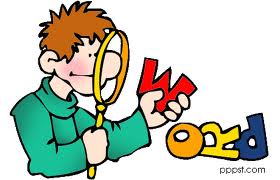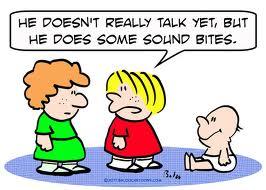Jan. 11, 2008
My brother-in-law, a bright political science professor, recently admitted that whilst expatiating in class, he was about to articulate a complex word, but at the last minute decided to use a simpler one. The word was dichotomy.
He wasn’t sure all the students would understand it, and says he’s becoming more conscious of the words he uses.
It got me thinking about big words. I recalled a morning a few months ago. I was religiously brushing my teeth while stuffing my head with the day’s news. A story I heard made me stop mid-brush. It was about serial killer Robert Pickton.
The defence was trying to prove that his IQ was below average. But in a test, Pickton could define words like lugubrious, pilfering, wildebeest and dromedary. Huh? This wasn’t the vocabulary of a simpleton. Pickton reasoned that he “knew animals”.
I reasoned that the average bloke on the street probably recognizes half of those words. And I felt I wasn’t doing a good enough job incorporating complex words into my daily conversations.
The English language is growing, bursting with new creations and a steady parade of words from other languages. So why, as English approaches its millionth word, do I feel my own vocabulary isn’t growing along with it?
After all, I love words. I really do. When I lived in Germany, I quickly boosted my German vocabulary using a very simple method: sticky notes.
At the end of the day, I gathered up the new words I’d discovered and wrote them on one half of a yellow sticky note. On the other half, I wrote simple definitions. I stuck it to my bathroom mirror, figuring I could learn them while I brushed my teeth (really, what else do you do?) One sticky note became two, then three and four until the whole side of the mirror was plastered with words.
My German roommate was thrilled because it boosted his English vocabulary. The system proved so successful, I made new vocabulary notes to bring with me on a bike tour. Whenever I got bored of cows and sunflowers, I learned a new word.
Back in Canada, I continued to feed my hunger for words. Whenever I came across a word I didn’t know, I jotted it down. The words I might actually use in daily conversation made the sticky note short list, words like: soporific, irascible, turpitude.
I stuck it to my bathroom mirror and each time I reviewed the list and recalled the definitions, I flashed myself a toothy grin (my teeth and vocabulary were mutually getting more brilliant). I puffed with pride when I casually dropped a nugget into conversation. That remark was so insensate, I’d say.
Our vocabulary acquisition, I realize, naturally drops off as we leave school. It’s not that we don’t learn new words. There are scrumptious words all over the place, ready to be picked up ingested. It’s just that fewer of them seem to be rolling off the tongues of the general populace. Maybe they’re just stuck in our heads.
A media trainer for more than twenty years,Barry McLoughlin teaches people to simplify their message. He too is noticing big words are dropping off. McLoughlin says politicians used to hide behind a wall of complicated words.
Joe Clark was known for his loquaciousness, referring to Canada as a “symmetrical confederation”.
Richard Nixon buried his message in cluttering phrases. McLoughlin says media and advertisers, attuned to shorter attention spans, are forcing increasingly simpler messages. In the past forty years, an average TV sound bite has shrunk from 42 seconds to seven.
“Vocabulary isn’t necessarily prized in today’s society,” says McLoughlin. “People are embarrassed to sound like a policy wonk or an egghead, so they use simpler words.” He says politicians can’t afford not to simplify their message: if they don’t, the media will.
Barack Obama is someone who employs small words to great effect, urging Americans to look past “red states” and “blue states” to see a United States. On the other hand, George W’s use of simple words is just, well, wrong on so many levels.
It’s not only the media; technology is also encouraging us to fit fewer words onto smaller screens, write more emails faster. As we try to get the message out quickly, we generally choose words that are most familiar to us.
“I think it’s a troubling sign in a way,” says McLoughlin. If you’re shrinking your vocabulary, you’re undermining the quality of dialogue you’re having, and that harms the quality of relationships you have.”
A strong vocabulary allows for nuance, extremely important in diplomacy and leadership positions, he says. Young people who are growing up without the ability to have a sophisticated vocabulary to calibrate what they want to say, undermine their ability to communicate.
John Serembus, a Philosophy professor at Widener University, is noticing a shift. For years, he’s taught in “sound bites” to deal with shorter attention spans. He teaches for ten minutes, stops for questions and a joke, teaches for ten minutes – you get it.
Lately, he’s noticing that vocabulary is becoming an issue. A student in his logic class didn’t fare well on a test, admitting he didn’t understand the material because he couldn’t follow the “big words” used in the lecture. It turned out they were words like implication, hypothetical and consistency.
“Needless to say I was taken aback. But as I thought about it, I realized that he probably never encountered those words until now,” says Serembus.“As a result,” he says, “I still use the words I want to use whether they are ‘big’ or not, but I do a lot of paraphrasing in simpler terms.”
And now, so many Canadians speak English as their second or third language.I often adapt my language for non-native speakers, andI wonder what kind of long-term effect this will have on our vocabulary.
Now I know there are those who will say au contraire, our vocabulary ain’t shrinking.
Language expert David Crystal says he hasn’t noticed any particular change in word length over the past decade.Yes, sentences have become shorter, he says, but that can create more reliance on the words selected, which can actually get longer.
Crystal says we tend to underestimate vocabulary sizes. Most people think the average size of a person’s vocabulary is a few thousand words, whereas it is actually tens of thousand.
It’s hard to know any of this for sure, though, because as Crystal says:”Vocabulary (by comparison with grammar and pronunciation) remains a hugely neglected topic of linguistic study…It’s the scale of the exercise which is so off-putting.”
In the meanwhile, I shall do my utmost to quaff from the fountain of English. I’m going back to my sticky note—brushing method.
Vocabulary, like teeth, needs to be kept in good working order to keep its bite.


